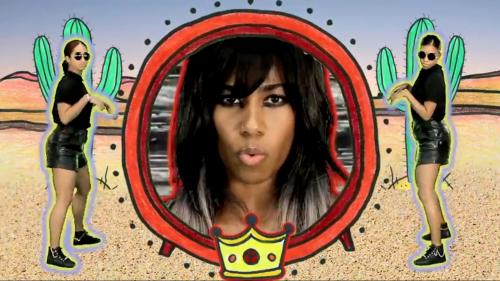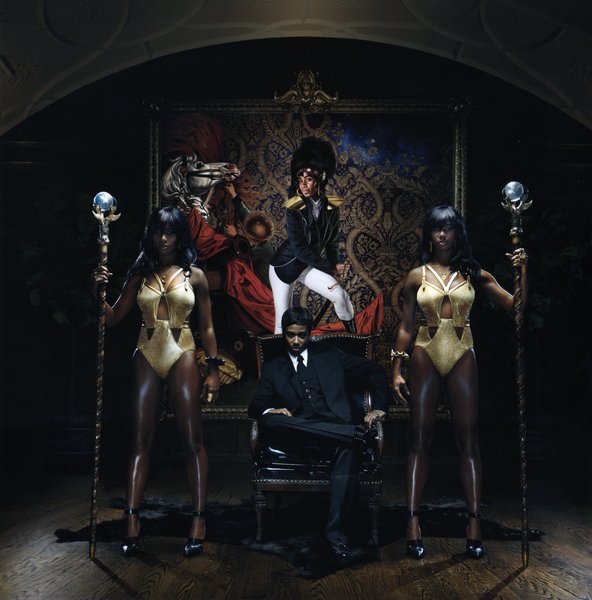Santigold is soon to return with her long-awaited sophomore album, Master Of My Make Believe.
The tracks that have emerged from it so far – the machine-gun attack of ‘Big Mouth’ and especially ‘ – bode well for the record, which comes four years after her highly promising, heavily-toured debut. In the intervening years, the lady known to her friends as Santi White has had to change her artist name from Santogold to Santigold, sign to a different label, and – perhaps ost importantly – do a bit of “actual living”.
FACT spoke to Santi in her West London hotel room earlier today, to find out more about the making of Master Of My Make Believe, which features contributions from Nick Zinner, Switch and Dave Sitek, among others. “I had to pull back and try something different,” she says.
;hl=en_US” />Loading Video…
;hl=en_US” allowscriptaccess=”always” allowfullscreen=”true”>
It’s been a while since your last album. What the hell took you so long?
“Well, I toured the first record for a year, because I was really interested in earning a solid fan base. That was really important to me. So I toured a little longer than most people do with their first album. I didn’t start my new record until 2010. I hadn’t written anything before that point [laughs], so I was starting completely fresh. And then it just took me a while to find my way into the process of doing things the second time around – I thought it was going to be the same process, and I thought I already knew everything, and who I was going to work with, so initially I got started the same way but then I was, like, this isn’t working at all.
“I had to pull back and try something different, you know? So I started working with some different people and then it started flowing. I knew I needed fresh energy, and to use it in a fresh way. I worked with new producers – Greg Kirsten, Dave Sitek, Nick Zinner, this guy Ricky Blaze, the list goes on – all people I’d never worked with before, and it was fun. The lyrics came a littler slower than they had in the past, but I really think that’s because I had to do a lot of growing as a person first… I felt what I was trying to say, but until I figured it out just through actually living, it wouldn’t come down on paper.”
“I felt what I was trying to say, but until I figured it out just through actually living, it wouldn’t come down on paper.”
So many artists sit down to write a second album and find that they have nothing to write about. The only thing they’ve got to draw upon is the touring of their first album.
“Exactly. You have to grow before you can begin writing again. And that’s how the music grows. So that’s what I did. I was mostly finished with the record last year, but then I had to change labels, so I decided to add a couple of songs, and here we are.”
Growth is important, certainly, but by now you must have a fairly fixed idea of what Santigold is, right? Or does everything remain in flux from one song to the next?
“I’m very clear what Santigold is, because it’s just so organic. There’s not much thought that goes into the carving of an image for me. This is just the music that I make. This is what I like. And it’s so easy because there aren’t any limitations. It’s so broad that I really can do anything that I want and call it Santigold. It’s not much of a cerebral process for me when I’m working; it’s really intuitive.”
Part of the new album was recorded in Jamaica. Did this come about through Switch and Diplo?
“Noooo [laughs]. I’m the one who showed them the studio! They started recording at this studio called G Jam in Port Antonio; they’d met the guy before, but I was the one who way back said, you need to check out this studio. And yeah, it’s amazing, so we all started going there. It’s in the middle of the rainforest-y area”
So it’s the setting rather than the studio itself that attracted you?
“It’s the setting, yeah. The studio’s nice, but it’s small and whatever. But it’s just so… you can step out of the studio, run down and go kayaking for half an hour and then come back, you know what I mean? It’s five minutes from the Blue Lagoon – I mean the real Blue Lagoon, the one that was in the movie The Blue Lagoon.”
“When you’re at home there’s just so much to do. You’re always behind.”
It’s important to take time out of everyday life when you want to create freely.
“That’s the thing. When you’re at home there’s just so much to do. You’re always behind. I have a baby dog to look after, I’ve got to get groceries, there’s a lot of stuff [laughs]. When you go away, you can just focus. Also, sometimes there’s just clarity that comes with being by the ocean.
“I’m very visual with the writing. There was this one experience where we went out on a boat and we were just flying over the water [makes whooshing sound], my whole body was flying and I’m just holding onto these rails, and the guys were playing a song through these speakers, and it’s distorting like crazy, and the water’s rushing past, and it sounded so awesome – and I was like, I want my record to feel like this. Sometimes a moment like that can influence a whole record.”
I gather producer Greg Kirsten was important in the making of the album.
“I did three songs with Greg Kirsten. He was great, because of everybody I worked with, he was probably one of the most musical. When it comes to writing songs, or even just writing parts for songs, I really like working with people who play instruments, people who have a lot of instruments around. So you can really jump about and play stuff. Greg’s really talented like that, and really quick at writing.
“Usually when I start to work with someone new, it takes me a while, and I have to get to be friends with them first, but it was just instant for us. He had all these really cool, old keyboards from the 80s, great mics and drums…I’m hands-on, so I love to pick up instruments and try parts. I mean, I suck at instruments, I’m the worst, but I can write on instruments. So I write parts, but it’s so much easier for me to do it if there are instruments everywhere rather than just someone sat in front of Logic. Because sat in front of Logic, it’s so much harder to communicate, it’s always like, ‘Can you do this? Can you do that?’.
Greg loves ordering stuff from eBay, so I’d show up and he’d be like, ‘I got you this drum machine!’. You know the kind, where you get to play with actual sticks. Amazing. Or I could be like, ‘You know what this song needs? Bottles.’ And he’d be, ‘I happen to be the best bottle player in LA!’ And he really was [laughs]. He played bottles, changed the water level for each note and layed down tracks and tracks of bottle! That was really fun.”
“It was about me claiming control of my creative vision, and accepting that I’m the ruler of my reality.”
What was Switch and Dave Sitek’s involvement?
Switch worked on the record quite a bit as well. Especially on songs like ‘Go’, ‘Pirate On The Water’ and ‘Big Mouth’. He does his thing on those, it’s a very special skill-set he brings. I mean, ‘Go’ was such a collage song – I started it with Q-Tip, then I had a drummer come in and play some punk-rock drums, then I got Switch and we cut up the vocals and all that, then I had Nick Zinner come and play guitar on it, then Karen got involved… but the song really wouldn’t be what it is without what Switch did on it, you know?
“I really love Dave Sitek’s sense of rhythm. His drum rhythms are really interesting. ‘Fame’ was a song he literally sent me and it was done, and that never usually happens, I just love it. Then he also worked on ‘This Isn’t Our Parade’, which has some incredible, dark drum rhythms.”
Did Sitek produce ‘Disparate Youth’?
“No, that was Ricky Blaze – a really young producer who’s just so talented. He sent it to me as a beat track, you know? It was just so good and had such a feeling, so all I did was add some guitars – Nick Zinner played some guitar on that – and a couple of things in the bridge, and we arranged it, and it was good to go. It had such a vibe already – I mean, what he does with those key pads…
“I think Ricky Blaze is just so good at making things immediate…that track couldn’t have been more me, but he did it before we even met. It’s got this kind of punk-rock bass, which he did on keys, and it’s not quite truncated cleanly so you can hear the click on it every time, and he’s got this clash sensibility where he takes a punk-rock bassline, then these really dirty south hip-hop drums, then these almost ravey keyboard sounds, and I couldn’t have been drawn to it more, you know? He nails it. He has a great sensibility, I’d love to work with him more.
The title of the album, Master Of My Make Believe, is great. Did you just pluck it out of the air?
“No! It took me months to decide on it. The title was like everything else on this record – it started with a feeling, and I had to find the words. And you know, it’s just so interesting, it’s like you know something inside, but you don’t know it, it comes up really slowly…and that’s what the title was. I asked myself: what was the process of making this record about for me? It was about me claiming control of my creative vision, and accepting that I’m the ruler of my reality. And that we all are. The world is only what we see it as. That’s what ‘Disparate Youth’ is about – we’re in control, and you don’t have to take what somebody tells you. You can figure it out for yourself, see it how you want to see it, and then it becomes that.
So I called the record Master Of My Make Believe because I am master of my make believe, and my make believe is also my reality. As it is for everyone. And I think if more of us take the time to get to know that about ourselves, then the world would be a way better place.”
Tim Purdom






























